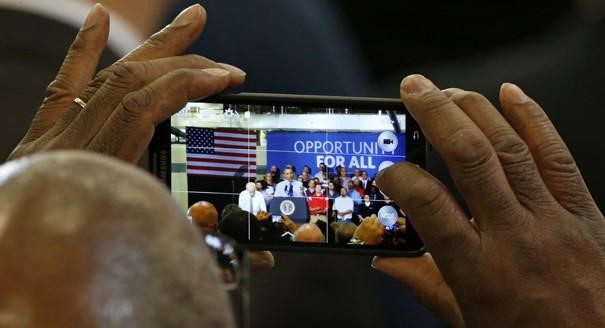Elections and smartphones: how gadgets change the electoral process

Four years ago, when Barack Obama announced his intention to become President of the United States again, only about a third of American adults had smartphones. Yes, you were not mistaken - in the spring of 2011 only every third American had a smartphone, according to Pew Research . The Internet and social networks at that time had a significant impact on the electoral process and the policy itself. But smartphones are not. Mobile devices changed something, but it practically did not affect the overall situation. But today everything has changed again. Changed and alignment in the political sphere of the United States. Hillary Clinton is now preparing for the official launch of his own campaign, Jeb Bush and Scott Woker show excellent results in exit polls. And now, more than half of the US population own smartphones - about 64% of American adults have such devices.
The new mobile reality is changing the news and advertising sphere, it also has a significant impact on the dynamics and development of political processes in the United States. This is particularly pronounced in 2016, journalists and political observers say. “The mobile industry will be one of the most important factors in 2016,” says Chris Lean, one of the analysts involved in the election race. “This will be one of the most difficult campaigns of all time, and many political players will use mobile advertising as a pre-election tool,” he continues.
Now mobile devices have a very strong impact on the lives of citizens of most countries ... Naturally, politicians will do their best to use the mobile sphere for their own purposes - to communicate with the electorate.
')
According to the Rew report, about 69% of smartphone owners use them to track important events, news, and incidents. 33% do it very often. The most active smartphone users are young Americans, and news consumption is “commonplace even for older mobile device owners,” the report says. Analysts say that 4 out of 10 smart phone owners aged 65 and older are following the news with their devices.
And it's not just news, but also media content, campaign videos, demotivators and other materials. This kind of content has an even greater influence on political processes than news and articles of an analytical nature. Applications are also being developed to monitor the nature and results of election campaigns of various participants in the presidential race in the United States. “In 2011, about a third of Americans followed election campaigns. Now two-thirds of US citizens are doing this, ”says Tommy Vietor, ex-speaker of Barack Obama.
Streaming applications like Periscope and Meerkat are now being actively used, allowing smartphone owners to stream video directly to their followers. Politicians do the same. If desired, at any time, any person can turn on the smartphone, and see firsthand what the candidate is doing from one or another political force.
For the latter, an increase in the activity of users of mobile devices and the number of devices themselves is a great way to promote themselves and their representatives, with the ability to quickly contact their voters. A big plus is the fact that you can work with them on a targeted basis, using different techniques for different social and age groups. This is much more effective than the performance of the same politician in front of a group of listeners.
Experts believe that in 2016 there will be a real “explosion” of agitation using mobile technologies. And all this is not an attack on all fronts, but a finely tuned targeting. Experts describe what will happen this fall as follows: “the voter will be identified with the help of his mobile device, as in the case of advertising the same mobile games, cars and other goods”. The age, social affiliation, language group will be identified, interesting. Campaigning from various parties will be directed to various categories of mobile device users, and on election day, politicians will even be able to study how many people visited polling stations using GPS and other geo-information data. Applications will be released to help the voter find their site.
All this will enable to intensify the entire election process. Voters will be able to receive information of interest to them very quickly, will be able to obtain the necessary data and the headquarters of various political forces using powerful analytical tools.
Indeed, in our time, a mobile device is a universal means of receiving and transmitting information. This TV, radio, cinema, telephone and computer. Mobile technologies blur the boundaries and bring people together, both literally and figuratively.
Already today we are launching and testing a wide variety of advertising campaigns in Appodeal , building an ideal targeting system that would allow any advertiser to find the right audience. Imagine how effective a campaign can be if you are able to segment your electorate and interact with each segment separately.
Source: https://habr.com/ru/post/294866/
All Articles